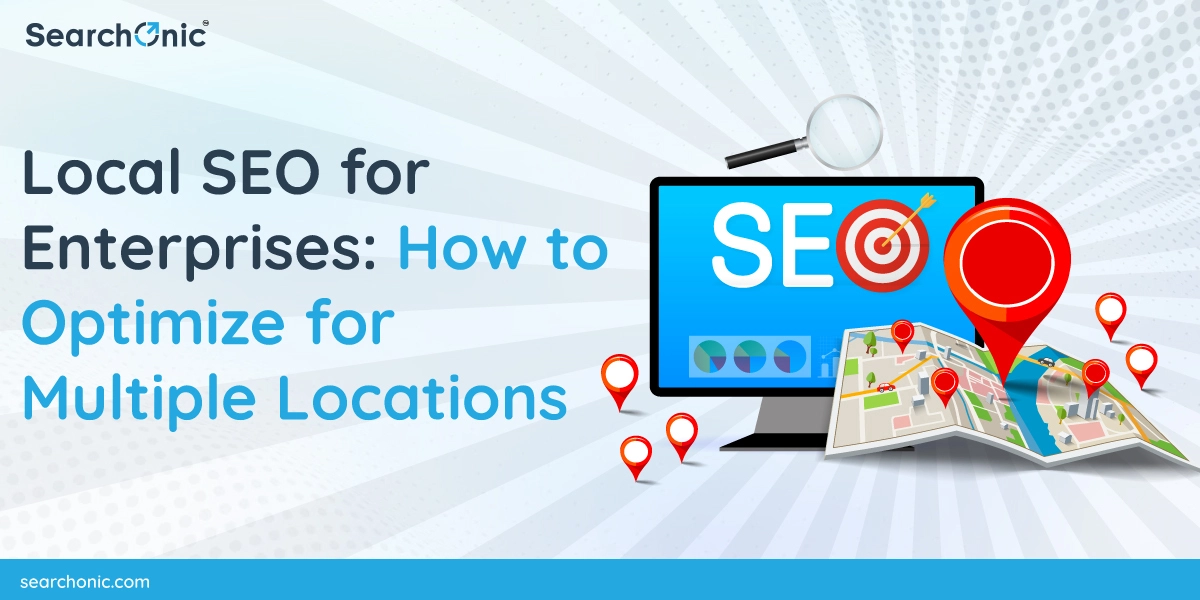Local SEO for Enterprises: How to Optimize for Multiple Locations
Local SEO for Enterprises: How to Optimize for Multiple Locations
Are you providing your services in multiple locations, or do you want your business to reach an audience from multiple regions digitally? It is time to introduce local SEO to your business. If you own a small size business, look out for local SEO services for small enterprises.
Local SEO is the strategic search engine optimization technique used to optimize your business website and increase its rank in location-based searches in search engines. This methodology includes incorporating location-specific keywords in the content. It also includes creating local citations and backlinks to improve credibility and authenticity. For enterprises with larger, more complex needs, enterprise SEO services can complement local SEO efforts to achieve broader reach and consistent results.
The SEO experts will also optimize your Google Business Profile listings. Based on a study, 4 users out of 5 do online searches on search engines with location-specific or local intent. And 76% of internet users prefer searching for a business using “near me.” This shows how important local SEO is for enterprises with multiple locations.
However, when you apply local SEO for multi-location businesses, you need to face complexity and challenges. Multi-location businesses usually struggle with local SEO due to inconsistent NAP, i.e., name, address, and phone information across listings. They also face challenges in managing reviews for different locations and creating location-specific website content. In addition, competition from local competitor businesses can hinder visibility, reputation, and credibility.
Let’s focus on and understand local SEO for multi-location enterprises in detail, including challenges and strategies.

Understanding Local SEO for Multi-Location Enterprises
Local SEO is a strategic SEO technique that increases your business's local search results online. It is beneficial for a business that has served a specific geographic location or multiple regions. Local SEO for enterprises enhances your website's online presence in top local search results, making it easier for your local audience to discover your services and products. By targeting specific city and address information, you move a step forward to be found online. This strategic optimization ultimately encourages customers to visit your physical store.
Likewise, multi-location SEO is very crucial for enterprises as it enhances visibility in local searches for each of your business locations. It ensures your potential customers find your nearest service branch. So, by optimizing for multi-location SEO, businesses can significantly boost foot traffic and strengthen brand awareness in their communities.
Note to understand what is enterprise local SEO before strategic implementation!
Key Challenges in Multi-Location Local SEO
Consistent NAP (Name, Address, Phone) Information
Are you aware of NAP? As stated above, NAP - Name, Address, and Phone Number is very important for local visibility. This is not only a physical address but also a web address. So, it is further extended to NAP+W. Do you know each mention related to your brand online is a citation? It includes your NAP. Maintenance of a consistent NAP is quite challenging for single-location businesses. It aids in managing multiple locations, increasing the chances of discrepancies. You must maintain accuracy across all citations to avoid potential confusion.
Managing Location-Based Content
When you own a single-location business, it becomes easier to manage content such as testimonials, web blogs, news, case studies, and galleries. But, when you own a multi-location business, you will face challenges in content management, making things more complicated.
You need to implement strategies for local SEO services for small enterprises in each of your locations. Success in search relies on delivering high-quality, relevant, and creative content while going the extra mile. For larger-size businesses, showcasing integrating with each location’s digital ecosystem and location-specific evidence allows Google to recognize and trust your site locally. This local trust ultimately boosts your site rankings in search results.
Handling Reviews and Ratings for Each Location
Larger companies often struggle with managing local-level reviews for different locations. While they might have some activity on social media or a national review strategy through platforms such as Trustpilot, this often results in their Google My Business and local citation pages featuring mostly negative reviews. Unfortunately, satisfied customers typically don’t take the initiative to leave feedback, further complicating the entire situation.
In order to enhance your local visibility, the foremost thing is to prioritize your local reputation in your enterprise's local SEO strategy. You must build a strong foundation of honesty, trust, and positive reviews from real customers on your Google My Business page and other review sites such as Yelp. This will further help you stand out in the competitive local landscape. Most importantly, it will encourage prospects to choose you over your competitors.
Avoiding Keyword Cannibalization Among Locations
Keyword cannibalization can badly harm your website's organic search performance by undermining your SEO efforts. When multiple pages compete for the same keywords, they may struggle to rank in top positions, regardless of their quality. So, you need to protect your valuable organic search visibility by addressing this issue proactively.
In order to avoid keyword cannibalization among locations, ensure that each location's content targets unique keywords relevant to its specific area. Create distinct landing pages for each site, focusing on local attributes and services to differentiate them. Regularly audit your content to identify overlapping keywords and adjust as needed to maintain clear distinctions.
Strategies to Optimize Local SEO for Multiple Locations
1. Optimize Google Business Profiles for Each Location
Most consumers search for businesses online compared to anywhere else. This ensures that local business listings are easily accessible on Google Maps. With a Business Profile, you can create an impressive listing in just a few minutes at no cost.
Next, ask enterprise local SEO experts to conduct precise optimization of your business profiles. It must include your location-specific details, such as categories, services, and photos. Prefer to add UTM tracking to your Google Business links for better analytics and measurements of the campaign’s effectiveness.
2. Create Individual Location Pages on Your Website
Be aware of the importance of individual location pages to boost organic traffic from each location to your website. Separate location pages enhance SEO by improving online visibility for each area you serve. Key elements to include are location-specific NAP information, embedded Google Maps for easy navigation, and testimonials or reviews from customers at that location. In addition, incorporate localized content such as relevant services, promotions, and blog posts to engage your target audience in an effective manner.
3. Use Localized Keywords for Each Location
Another strategic approach is to conduct in-depth keyword research tailored to each location's specific market to identify relevant terms. Use localized phrases, such as “SEO agency in [City],” to enhance search relevance.
Incorporate these keywords into title tags, meta titles, meta descriptions, and content to optimize your pages. It will boost visibility in local searches and bring in organic traffic potential from each area you serve.
4. Consistency Across All Directories and Listings
It is important to maintain consistent NAP information across local directories and citation sites to establish trust and improve local SEO. Utilize tools such as Moz Local and Yext to help ensure accuracy across multiple digital platforms.
In addition, hire enterprise local SEO services to promptly update directories whenever your information changes to prevent confusion and maintain a strong online presence for your business.
5. Managing Reviews and Reputation for Each Location
It is your duty to request users or consumers to leave reviews and respond promptly in order to boost engagement. Highlight positive reviews on each location's page to improve credibility and attract new consumers.
Negative reviews need to be addressed professionally and constructively. You’re your consumers, and you value each piece of feedback and move forward to improve. Implementation of these practices will help strengthen your reputation across all locations.
Content Marketing for Local SEO Success
Creating Localized Blog Content
You need to create location-based blog content by writing about local events, community involvement, and partnerships to engage the audience. Highlight location-based case studies, blogs, articles, or testimonials to showcase your business's impact within the community.
Utilizing Social Media for Each Location
Utilize and employ social media business accounts for each location by creating separate profiles or crafting location-specific posts. Boost your engagement with the local community through creative content and robust interactions. Incorporate local hashtags to increase visibility and connect with potential customers.
Technical SEO for Local Multi-Location Enterprises
Schema Markup for Local Businesses
Implement schema markup for each location page to enhance search engines' understanding of your business details. Hire local SEO services for small enterprises to help implement this strategy. This structured data helps drive desired online visibility and recognition in search results, resulting in richer snippets. This further makes your listings highly attractive to the potential consumer base.
Mobile Optimization for Location Pages
Make sure each location page is mobile-friendly in order to cater to on-the-go searches by potential organic customers. A responsive design enhances user experience, allowing visitors to easily access information and navigate your site from their mobile devices. With this, your physical store will witness a higher foot traffic rate.
Site Speed and User Experience
Improve site speed, particularly for mobile users, to ensure quick loading times that keep local visitors engaged. Enhance user experience with a clean and accessible design that makes navigation easy, allowing local users to find information effortlessly and encouraging them to explore your location pages further.
Tracking and Measuring Success
Setting Up Google Analytics and Google Search Console for Each Location Set up these Google tools for each specific location to monitor performance metrics individually. Track key data such as traffic sources, user behavior, and search queries specific to each location.
Using Google Business Insights
Leverage Google Business Insights to gain valuable data on searches, views, and actions for each location. It will let you understand customer interactions and conduct accurate optimization of your location-based marketing strategies.
Monitoring Ranking Changes with Local SEO Tools
Use the best enterprise local SEO tools such as BrightLocal, SEMrush, and Moz Local to monitor ranking changes effectively. These SEO tools provide essential data and insights into your local search performance, helping you adjust strategies as necessary.
Common Mistakes to Avoid in Multi-Location SEO
Duplicate Content Across Location Pages
The creation of duplicate content for multiple location pages confuses search engines and dilutes SEO efforts. Each location page must feature unique and localized content that reflects the specific services and location attributes.
Inconsistent Information Across Listings
Inconsistent NAP information across various listings can cause harm to your site’s credibility and search rankings. Make sure that all business directories and platforms reflect the same. Mention accurate details for each location to build trust with search engines.

Not Claiming All Location Profiles on Google and Other Directories
Failing to claim profiles for each location on Google and other directories means missing out on valuable digital visibility. Claiming these profiles allows you to manage information, respond to reviews, and optimize your local presence in the right manner.
Ignoring Negative Reviews
Neglecting negative reviews can damage your reputation and discourage potential customers. Addressing these reviews promptly and professionally demonstrates your commitment to the best enterprise local SEO practices for customer satisfaction and mitigating their impact.
Boost Your Local Reach—Optimize Multi-Location SEO Today!
Are you ready to implement multilocation SEO strategies? Shift your focus on maintaining consistent NAP information across all listings, creating unique and relevant content for each site, and actively managing customer reviews. Next, utilize location-based keywords and leverage Google My Business to improve local engagement and drive organic traffic. Always keep an eye on challenges that affect your local SEO techniques and hire an enterprise SEO expert for this.
Contact our reputed SEO professionals for professional guidance on managing multi-location SEO for your enterprise to navigate challenges and maximize your online presence across all locations!

CEO & Co-founder at Searchonic & Midas Touch Infotech. I help Businesses To Increase Traffic & Leads with the Help of SEO.


